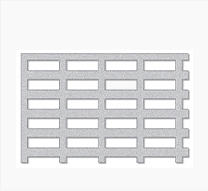loading...
- No. 9, Xingyuan South Street, Dongwaihuan Road, Zaoqiang County, Hengshui, Hebei, China
- admin@zjcomposites.com
- +86 15097380338
- Welcome to visit our website!
Advancements in Composite Materials for Enhanced Performance of FRP Vessels in Marine Applications
The Rise of FRP Vessels Revolutionizing Storage and Transportation
Fiber Reinforced Polymer (FRP) vessels have emerged as a pivotal innovation in various industries, offering numerous advantages over traditional materials. As the demand for robust, lightweight, and corrosion-resistant storage solutions continues to rise, FRP vessels are becoming the preferred choice for many applications.
FRP vessels are composites made from a polymer matrix reinforced with fibers. This unique combination results in materials that exhibit exceptional strength-to-weight ratios, making them ideal for various industrial applications. One of the most significant benefits of FRP vessels is their resistance to corrosion. Unlike metal containers that can corrode due to exposure to harsh chemicals, FRP vessels can withstand a wide range of aggressive environments, including acidic and alkaline solutions. This characteristic not only extends the lifespan of the vessels but also reduces maintenance costs associated with corrosion-related damage.
The Rise of FRP Vessels Revolutionizing Storage and Transportation
The design versatility of FRP vessels is another noteworthy feature. These vessels can be manufactured in various shapes and sizes, tailored to meet specific operational needs. This adaptability allows industries to optimize their storage solutions according to their requirements, whether it's for large-scale storage in industrial settings or smaller units in residential applications. Furthermore, FRP vessels can be customized with additional features, such as insulation and specialized linings, to enhance their performance in extreme conditions.
frp vessels

In addition to their functional advantages, FRP vessels are environmentally friendly. The use of composites reduces the reliance on heavy metals, which can have detrimental effects on the environment. Moreover, many manufacturers are now focusing on creating sustainable production processes, utilizing recycled materials in the production of FRP vessels. This commitment to sustainability aligns with the global shift towards eco-friendly practices across industries.
The versatility of FRP vessels extends to a wide range of applications. In the chemical industry, they are used for storing corrosive substances, ensuring safe and reliable containment. In the water treatment sector, FRP tanks are utilized for filtration and storage, providing durability and efficiency. Additionally, the food and beverage industry benefits from FRP vessels due to their hygienic properties, which prevent contamination and maintain product integrity.
Despite their numerous advantages, the adoption of FRP vessels has not been without challenges. The initial costs for manufacturing FRP vessels can be higher than traditional metal options, which may deter some businesses. However, when considering the long-term savings in maintenance and replacement, along with enhanced performance, the investment in FRP vessels often proves to be worthwhile.
In conclusion, FRP vessels represent a significant advancement in storage and transportation solutions. Their lightweight, corrosion-resistant properties, coupled with design flexibility and environmental benefits, make them an attractive choice for a variety of industries. As technology continues to evolve, it is likely that we will see even greater innovations in the field of FRP materials, enhancing the capabilities and applications of these remarkable vessels. With the growing emphasis on sustainability and efficiency, FRP vessels are poised to play a crucial role in the future of industrial storage and transportation systems.
-
The Rise of FRP Profiles: Strong, Lightweight, and Built to LastNewsJul.14,2025
-
SMC Panel Tanks: A Modern Water Storage Solution for All EnvironmentsNewsJul.14,2025
-
GRP Grating: A Modern Solution for Safe and Durable Access SystemsNewsJul.14,2025
-
Galvanized Steel Water Tanks: Durable, Reliable, and Ready for UseNewsJul.14,2025
-
FRP Mini Mesh Grating: The Safer, Smarter Flooring SolutionNewsJul.14,2025
-
Exploring FRP Vessels: Durable Solutions for Modern Fluid HandlingNewsJul.14,2025
-
GRP Structures: The Future of Lightweight, High-Performance EngineeringNewsJun.20,2025
